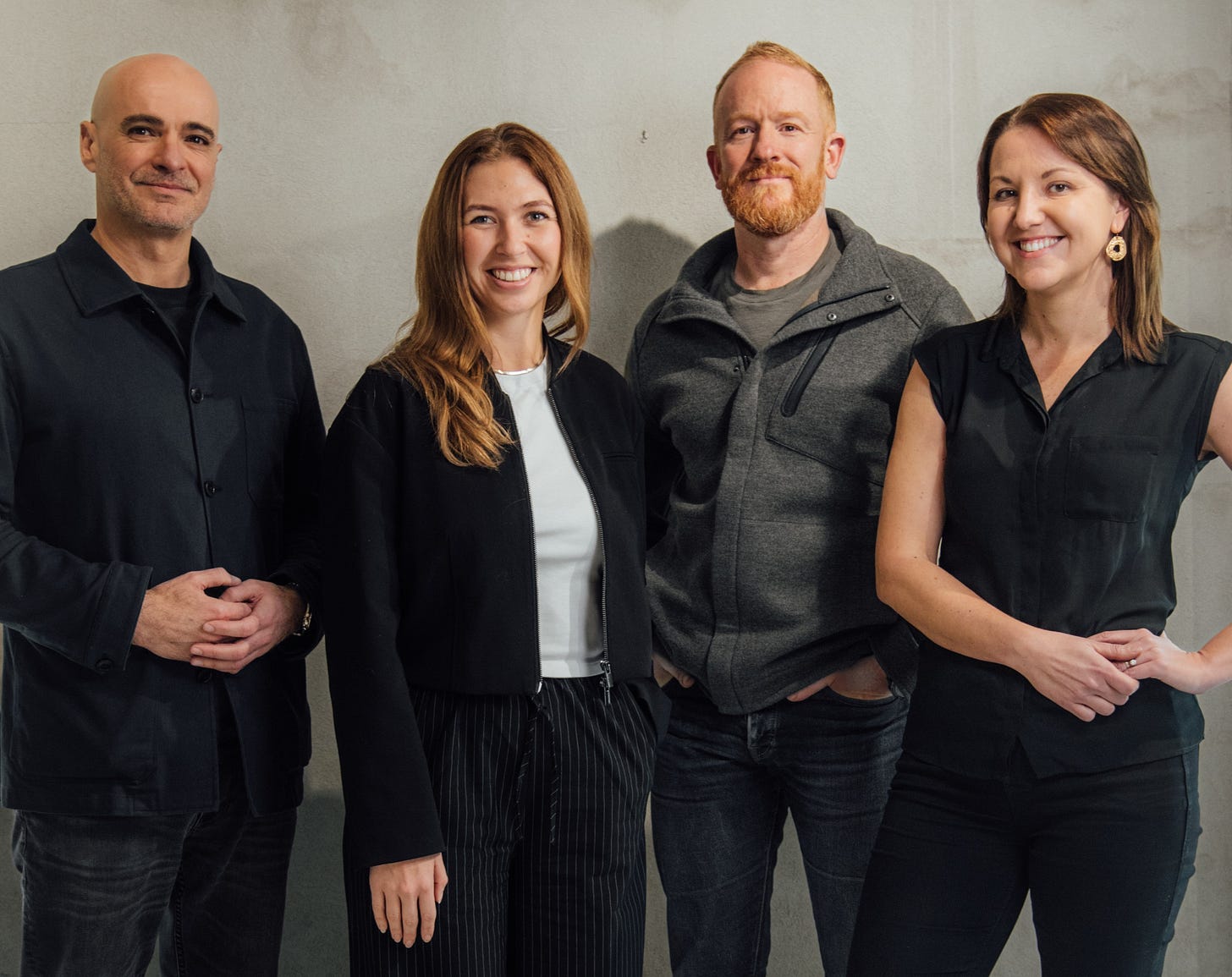Aether raises $3.8m to inject AI into marketing presentations
Plus: Nuro closes $203 Million Series E and I muse a little about A.I psychosis.
Happy Friday!
Kia ora Caffeinators,
It’s Friday and last evening’s Icehouse Ventures Annual Investor Showcase was a big night for founders, a big night for investors and with the quality of wine on offer, a big night for more than a few livers in the room.
I will bring a more detailed rundown of some of the more interesting pitches, pictures and data points which came out of the showcase next week.
Had to put put a bonus newsletter today however to shout out one company which launched on the same night it pitched with some big numbers to back it, particularly as it comes courtesy of our friends and neighbours over at New + Improved.
As always, thank you to everyone who has upgraded to a paid subscription or simply recommended Caffeine to friends and whānau.
We couldn’t do any of this without you.
Finn and the CAFFEINE team
Aether raises $3.8m to inject AI into marketing presentations: Talk about coming out swinging. Our friends and neighbours over at New + Improved launched their first venture the very night they debuted at yesterday’s showcase.
Aether helps large organisations solve three pervasive issues: institutional amnesia (where valuable data insights are lost or under-utilised), wasted productivity on repetitive research production, and outdated information embedded in static decks.
The company’s software integrates live data directly into presentation and document workflows, eliminating the manual copy-paste grind that can consume up to 40% of marketers’ time.
Once plugged into data sets, Aether creates customisable presentations using a business’ branding within minutes and allows them to be effortlessly updated as the underlying data is refreshed.
The company has a very strong start, with a $3.8m seed round led by Icehouse Ventures, with additional backing from Brand Fund 2. Aether has already secured contracts with major enterprise customers across Australia, New Zealand, and the U.S.
Already generating over $600,000 in annual recurring revenue, Aether is seeing rapid adoption among large-scale marketing teams where inefficiencies are most acute.
“They say measure twice, cut once, and this should also be true of marketing workflows. As it stands, most slide decks are recut every time a presentation happens, wasting valuable resources from internal teams,” said Carsten Grueber, Co-founder and CEO of Aether.
“Aether transforms presentations from static documents into living, connected assets that are accurate, always up-to-date, and ready to share. Instead of marketers spending half a week building the monthly performance report, they can spend that same time doing the actual marketing itself,” said Grueber, who was formerly Country Manager of TikTok New Zealand.
The Powerpoint industrial complex is vast, powerful and ripe for disruption. Think about how many jobs in the world have huge amounts of drudgery baked in because they boil down to laboriously constructing slideshows, more focused on the the labour of building them than actioning the data represented in them.
Congrats to the team and can’t wait to see how far you take this one.
Nuro closes $203 Million Series E: Honestly, its not that often I have to go this deep into the funding round alphabet but I am very pleased that I am, considering the multiple Kiwi connections in this story. Self driving and robotics company Nuro just closed a titanic $203m USD Series E to advance its self-driving technology and commercial partnerships. The round includes Uber, returning investor Baillie Gifford, and new investors including our very own home grown Icehouse Ventures plus Kindred Ventures, NVIDIA, and Pledge Ventures.
Nuro has raised over $2.3 billion to-date. With over nine years of development and five years of real-world deployments across multiple US states, Nuro remains among the few companies that have successfully deployed autonomous vehicles at city scale with no safety driver.
It’s an astonishing achievement from Dave Ferguson, the Kiwi founder behind Nuro. He beamed into the showcase last night to give CEO Robbie Paul a light ribbing, laughing that it only took raising $200m to finally get Icehouse Venture’s attention.
The promise of the self driving car has been a tech pipe dream which is always a little further away from being realised than we hoped. I think Nuro is really starting to close the gap on this one. I also think Dave is right when he says that while our kids generation might learn to drive, they will almost never have to.
Microsoft AI Chief says ‘seemingly conscious’ AI is Coming, but we must build AI for people; not to be a person: Perfect Parting Shot fodder here for when you’re needing something to stress about this weekend.
We’re all seeing the same spike in worrying headlines about bizarre, unhealthy and occasionally tragic relationships people are building with AI.
Even in my personal life, I have started to hear stories from people close to me about relationships with AI that cross from using a tool and to being in a relationship with…something.
In the same way we once worried about certain friends and relatives falling down a conspiracy rabbit hole with the aid of Youtube, something adjacent but altogether stranger seems to be happening with so called ‘GPT psychosis’.
LLMs are famous optimised to reflect and amplify your desires, curiosities and interests back at you with a big dose of sycophancy.
To LLMs, often every thought you’ve had, no matter how unhinged, is truly revelatory and should be encouraged further. Particularly so called companion bots who are optimised for engagement above all.
A certain subset of the population seems vulnerable to forming unhealthy relationships with these LLMs or at least having underlying issues exacerbated. These systems have also proven very bad at pulling the breaks once a toxic spiral begins.
And I don’t mean to suggest it’s only people with pre-existing mental health conditions which could be affected. One of the most fundamental human traits is our ability to relate on a deep emotional level to things we know aren’t real people. It’s why books make us cry, we name our cars or I will get sad at literally any object being thrown in he trash provided it has googly eyes put on it first.
I don’t think we’re ready for a world of things brilliantly designed to seem human which are not. Which trap us in what we think is a fantasy relationship but really is just a twisted reflection of our own mind. All the toxicity and siloing and echo chambering of social media but taken to a far darker extreme.
Someone else worrying about all this is thankfully, someone who can actually do something about it. Microsoft AI Chief and author of the ‘Coming Wave’, Mustafa Suleyman.
He penned a blog post on Tuesday which made an interesting argument about why he thinks the pressing near term danger is not of genuinely conscious machines (which may never arrive) but seemingly conscious ones.
Key excerpts below but highly recommend reading the full blog here.
“In this context, I’m growing more and more concerned about what is becoming known as the “psychosis risk”. and a bunch of related issues. I don’t think this will be limited to those who are already at risk of mental health issues. Simply put, my central worry is that many people will start to believe in the illusion of AIs as conscious entities so strongly that they’ll soon advocate for AI rights, model welfare and even AI citizenship. This development will be a dangerous turn in AI progress and deserves our immediate attention.”
“If some people start to develop SCAIs and if those AIs convince other people that they can suffer, or that it has a right to not to be switched off, there will come a time when those people will argue that it deserves protection under law as a pressing moral matter. In a world already roiling with polarized arguments over identity and rights, this will add a chaotic new axis of division between those for and against AI rights.”
“SCAI is something we must confront now. In many ways it marks the moment AI becomes radically useful - when it can operate tools, when it can remember every detail of our lives and help in a tangible, granular sense. And yet in that same time frame, someone in your wider circle could start going down the rabbit hole of believing their AI is a conscious digital person. This isn’t healthy for them, for society, or for those of us making these systems.”
That’s it for today, thanks for reading. Want to get in touch with a news tip, bit of feedback or just to chat? Email hello@caffeinedaily.co







